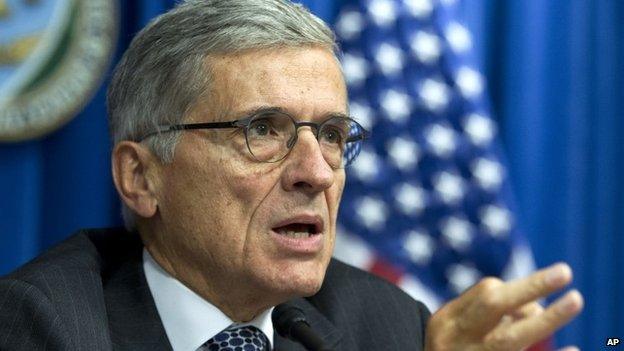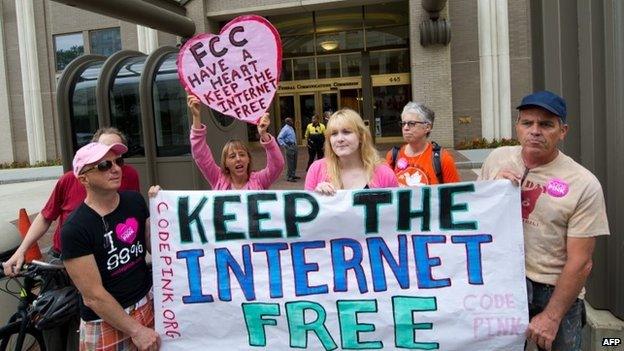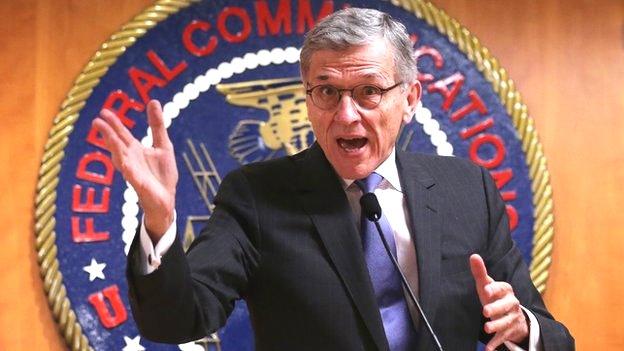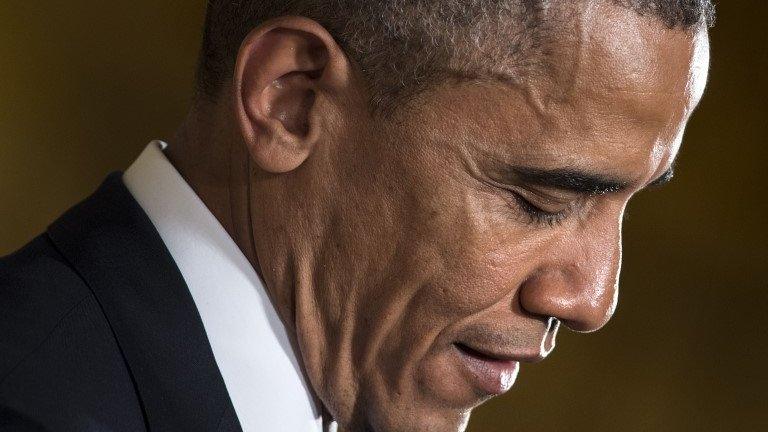Net neutrality rules passed by US regulator
- Published

The FCC has given itself far more bite when it comes to regulating broadband firms
New rules on how the internet should be governed have been approved by the Federal Communications Commission.
In what is seen as a victory for advocates of net neutrality, the commission voted in favour of changes proposed by chairman Tom Wheeler.
Three commissioners voted in favour and two against.
The US Telecommunications Industry Association said that broadband providers would take "immediate" legal action over the rule changes.
The main changes for broadband providers are as follows:
Broadband access is being reclassified as a telecommunications service, meaning it will be subject to much heavier regulation
Broadband providers cannot block or speed up connections for a fee
Internet providers cannot strike deals with content firms, known as paid prioritisation, for smoother delivery of traffic to consumers
Interconnection deals, where content companies pay broadband providers to connect to their networks, will also be regulated
Firms which feel that unjust fees have been levied can complain to the FCC. Each one will be dealt with on a case by case basis
All of the rules will also apply to mobile providers as well as fixed line providers
The FCC won't apply some sections of the new rules, including price controls
Ahead of the vote, commissioners heard from a variety of net neutrality advocates, including the chief executive of online marketplace Etsy and a TV drama writer. Web founder Sir Tim Berners-Lee also contributed via video link.
Columbia Law School Prof Tim Wu, who originally coined the phrase net neutrality, welcomed the ruling.
"It is a historic day in the history of the internet," Prof Wu said. "Net neutrality, long in existence as a principle, has been codified in a way that will likely survive court scrutiny. More generally, this marks the beginning of an entirely new era of how communications are regulated in the United States."
"I think both the Obama Administration and the Federal Communications Commission can consider the rule a legacy achievement."
'Misguided'

Protesters gathered outside FCC headquarters when it was hinted it would allow net fast lanes
But broadband provider Verizon said that the rules being adopted by the FCC were "written in the era of the steam locomotive and the telegraph".
"Today's decision by the FCC to encumber broadband internet services with badly antiquated regulations is a radical step that presages a time of uncertainty for consumers, innovators and investors," it said in a statement.
"History will judge today's actions as misguided".
Scott Belcher, chief executive of the Telecommunications Industry Association, said that the "onerous set of rules" was an "over-reaction from the FCC".
He predicted a two-pronged response from the broadband providers.
"They will take legal action right away and they will continue to work in Congress to get legislation to address these rules," he told the BBC.
US broadband providers are estimated to spend around $73bn (£47bn) a year on upgrading infrastructure. Net usage is expected to double over the next 10 years and data transmissions to increase eight-fold.
"The internet is built on infrastructure. Even to keep at a steady state providers are going to have to invest in infrastructure but they need certainty that they can get a return on their investments," said Mr Belcher.
He added that there were concerns that future administrations may use the rules to impose even more restrictions on broadband providers.
"The next administration may want to introduce price controls or control infrastructure help where cables can be laid. They could drive the internet to a halt."
Fast lanes
The need for new rules was a result of a legal action taken in January 2014 by broadband provider Verizon, which challenged existing net neutrality guidelines.
The court found that the FCC had improperly regulated internet providers as if they were similar to a public utility when they were officially classified as information services.
It spurred calls for the FCC to reclassify broadband as a utility, with content giant Netflix, one of the most vocal lobbyists.
Hints that the commission was planning on rewriting the rules to allow internet fast lanes was met with a volley of criticism.
A record four million comments were sent to the regulator, campaigners protested outside its Washington headquarters and President Obama eventually intervened, urging the FCC to adopt the "strongest possible" rules.
- Published4 February 2015

- Published10 November 2014

- Published14 May 2014
